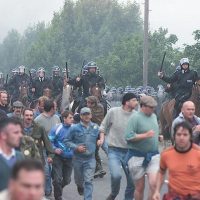On 18 June of that year, the Orgreave coking plant was the site of one of the strike’s most violent confrontations. It began in a field near the plant and culminated in a cavalry charge through the village of Orgreave.
Jeremy Deller’s The Battle of Orgreave, staged seventeen years later, was a spectacular re-enactment of what happened on that day. It was orchestrated by Howard Giles, a historical re-enactment expert and the former director of English Heritage’s event programme.
More than 800 people participated in the re-enactment, many of them former miners, and a few former policemen, reliving the events from 1984 that they themselves took part in. Other participants were drawn from battle re-enactment societies across England.
The Battle of Orgreave was filmed by Mike Figgis for Artangel Media and Channel 4, and aired on Sunday, 20 October 2002. The film intercuts dramatic photographic stills from the clashes in 1984 with footage of the clashes re-enacted in 2001, together with moving and powerful testimonies, to tease out the complexities of this bitter struggle.
Mac McLoughlin, a former miner and serving policeman on the field that day, reveals details about the build-up within the police force prior to the stand-off; David Douglass (NUM) talks about the meaning of the confrontation in relation to the trade union movement in England; Stephanie Gregory (Womens’ Support Group) reminisces about the effects on family life; Tony Benn talks about the media’s role in covering up the truth about the strike in 1984; and Jeremy Deller contextualises this event and highlights its contemporary cultural relevance.



